英语高一---时态(一)
四川省宜宾市一中高一英语 语法专项(一)时态教学设计-人教版高一全册英语教案
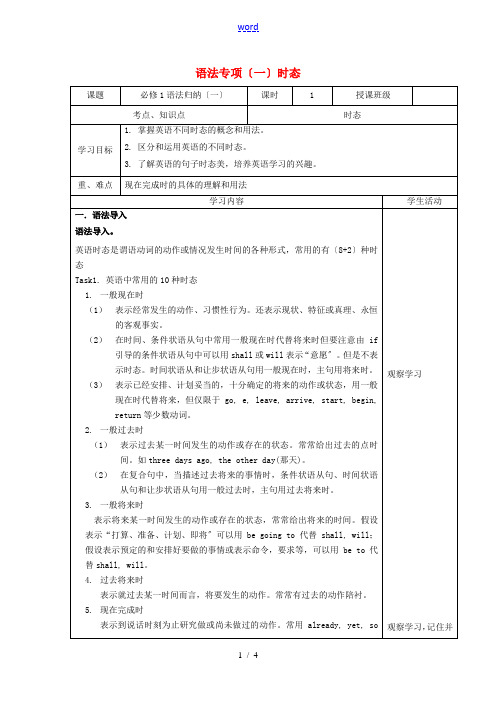
语法专项〔一〕时态far, by now, since two days ago, for a few days, 等词语做状语。
运用。
注意:give, see, e, arrive, leave, begin, start, finish, join, bee, borrow,lend, die, end等点时间动词可以用于完成时,但是在肯定句中不能与表示一段时间的since和for短语连用,因为点时间动词不能够延续,而在否定句中可以与表示一段时间的for短语连用,因为否定的点时间动词可以看做一种可延续的状态。
6.过去完成时表示截止到过去某一时刻或在过去的动作之前已经做或尚未做的动作。
7.现在进行时(1)表示现状正在进行的动作;(2)有时候用现在进行时表一般将来时,表示不久将要发生的动作,主要用于e, go, leave, arrive, start.等动词。
8.过去进行时表示过去某一时刻或过去某一段时间内正在进行的动作;句中常有过去的点时间或过去动作陪衬。
9.现在完成进行时表示从过去某一时间开始,一直延续到现在还在进行的动作。
10.过去完成进行时表示从过去某一时间开始,一直延续到过去的另一时间还在进行的动作。
Task2. 指出以下句子的不同时态1. She regretted telling Jane about her own affairs._____________________2. My neighbor does outdoor exercises every morning. ________________3. When he arrives, I will let you know. ______________________4. The train from Harbin arrives at 5:30 this afternoon.________________5. When are you going to answer them? _____________6. The meeting is to be held next Monday. ____________7. Mike has been here for a year. ____________8. He said he would not e home that day. _______________9.The manager is studying the contract.____________10. She said she would give me a gift when she came again.______________11.The train is leaving in 5 minutes. ______________12. At 9 pm last night, I was watching football on TV.13. You have been working for hours. You should stop to have a rest._________14. When the secretary came in and interrupted us, we had been talkingfor an hour. _______二.重难点探究探究点一:语境中的过去式,往往表示“刚才、刚刚〞之意,暗指现在已经“不再这样〞。
英语高一必修一语法
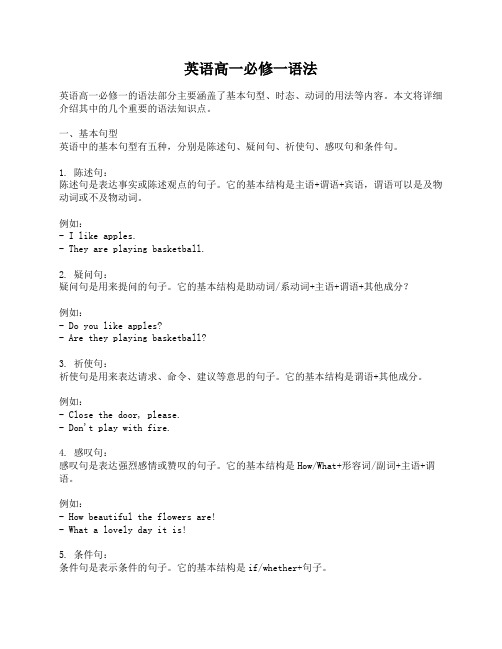
英语高一必修一语法英语高一必修一的语法部分主要涵盖了基本句型、时态、动词的用法等内容。
本文将详细介绍其中的几个重要的语法知识点。
一、基本句型英语中的基本句型有五种,分别是陈述句、疑问句、祈使句、感叹句和条件句。
1. 陈述句:陈述句是表达事实或陈述观点的句子。
它的基本结构是主语+谓语+宾语,谓语可以是及物动词或不及物动词。
例如:- I like apples.- They are playing basketball.2. 疑问句:疑问句是用来提问的句子。
它的基本结构是助动词/系动词+主语+谓语+其他成分?例如:- Do you like apples?- Are they playing basketball?3. 祈使句:祈使句是用来表达请求、命令、建议等意思的句子。
它的基本结构是谓语+其他成分。
例如:- Close the door, please.- Don't play with fire.4. 感叹句:感叹句是表达强烈感情或赞叹的句子。
它的基本结构是How/What+形容词/副词+主语+谓语。
例如:- How beautiful the flowers are!- What a lovely day it is!5. 条件句:条件句是表示条件的句子。
它的基本结构是if/whether+句子。
例如:- If it rains tomorrow, we will stay at home.- Whether she comes or not, I will go to the party.二、时态在英语中,时态用于表示动作发生的时间。
高一必修一中涵盖了一般现在时、一般过去时、一般将来时等几个基本时态。
1. 一般现在时:一般现在时用于表示经常性的动作、习惯、真理、科学事实等。
它的基本结构是主语+谓语。
例如:- She goes to school every day.- Water boils at 100 degrees Celsius.2. 一般过去时:一般过去时用于表示过去发生的动作或状态。
高一英语单词表上册知识点

高一英语单词表上册知识点一、动词时态和语态英语的动词时态和语态是学习英语的基础,下面是高一英语单词表上册中的常见时态和语态:1. 一般现在时:用于描述经常发生的动作或现实情况。
例句:I work in an office.(我在一家办公室工作。
)2. 现在进行时:用于描述目前正在进行的动作。
例句:She is studying at the library.(她正在图书馆学习。
)3. 一般过去时:用于描述过去发生的动作或状态。
例句:They visited Beijing last year.(他们去年参观了北京。
)4. 过去进行时:表示过去某个时间段内正在进行的动作。
例句:We were watching a movie at that time.(那时我们正在看电影。
)5. 一般将来时:表示将来要发生的动作或存在的情况。
例句:I will go shopping tomorrow.(我明天要去购物。
)6. 现在完成时:表示过去开始仍未结束或与现在有关的动作或状态。
例句:She has lived in this city for ten years.(她在这个城市已经住了十年。
)7. 过去完成时:表示在过去某个时间或动作之前已经发生的动作或状态。
例句:By the time she arrived, they had already left.(她到达时,他们已经走了。
)8. 被动语态:表示主语是动作的承受者而不是执行者。
例句:The book was written by Mark Twain.(这本书是马克·吐温写的。
)二、名词的复数形式名词在英语中有单数和复数形式,下面是高一英语单词表上册中常见名词的复数形式:1. 一般名词复数:在名词后加-s,如books(书)。
2. 以-s,-x,-sh,-ch结尾的名词,复数形式直接加-es,如boxes(盒子)、watches(手表)、bushes(灌木)、branches(树枝)。
动词时态(1)一般时态的构成与用法+课件-2025届高三上学期英语一轮复习专项

一般过去时的用法
② 一般过去时的特殊用法
b. 在口语中,一般过去时往往显示委婉客气。
I wondered if you could give me a hand. 我想请你帮个忙。 Might I come and see you tonight? 我想今晚来看你,好吗?
一般现在时和一般过去时的比较
一般将来时的用法
③表示同意或答应做某事
That bag looks heavy. I'll help you with it. 这个包看起来很重,我来帮你提。 I won't tell anyone what happened, I promise. 我保证不告诉别人所发生的事。
一般将来时的用法
一般将来时的用法
①表示将要发生的动作或存在的状态
I shall be free this afternoon. 我今天下午有空。 There'll be no chemistry classes tomorrow. 明天没有化学课。 They will probably go to Shanghai for their holiday. 他们可能去上海度假。
高中英语动词时态精讲(1)
一般时态的构成与用法
英语中的现在时
在英语中,不同时间发生的动作或存在的状态,要用 不同的动词形式来表示,这就叫做动词的时态。
一般时包括一般现在时、一般过去时、一般将来时和 一般过去将来时。
目录
01
ቤተ መጻሕፍቲ ባይዱ
02
03
04
一般现在时 一般过去时 一般将来时 一般过去将来时
01 一般现在时
一般过去时的用法
① 一般过去时的基本用法
高一英语语法梳理之时态语态
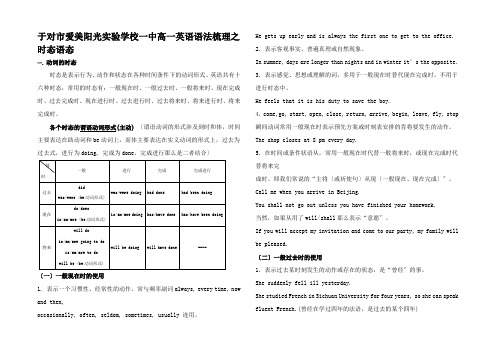
于对市爱美阳光实验学校一中高一英语语法梳理之时态语态一.动词的时态时态是表示行为、动作和状态在各种时间条件下的动词形式。
英语共有十六种时态,常用的时态有:一般现在时、一般过去时、一般将来时、现在完成时、过去完成时、现在进行时、过去进行时、过去将来时、将来进行时、将来完成时。
各个时态的谓语动词形式(主动) 〔谓语动词的形式涉及到时和体,时间主要表达在助动词和be动词上,而体主要表达在实义动词的形式上,过去为过去式,进行为doing, 完成为done,完成进行那么是二者结合〕〔一〕一般现在时的使用1. 表示一个习惯性、经常性的动作。
常与频率副词always, every time, now and then,occasionally, often, seldom, sometimes, usually 连用。
He gets up early and is always the first one to get to the office. 2. 表示客观事实、普遍真理或自然现象。
In summer, days are longer than nights and in winter it’s the opposite.3. 表示感觉、思想或理解的词,多用于一般现在时替代现在完成时,不用于进行时态中。
He feels that it is his duty to save the boy.4. come,go, start, open, close, return, arrive, begin, leave, fly, stop 瞬间动词常用一般现在时表示预先方案或时刻表安排的肯将要发生的动作。
The shop closes at 8 pm every day.5. 在时间或条件状语从,常用一般现在时代替一般将来时,或现在完成时代替将来完成时。
即我们常说的“主将〔或祈使句〕从现〔一般现在、现在完成〕〞。
高一英语将来进行时(一)解题方法和技巧及练习题
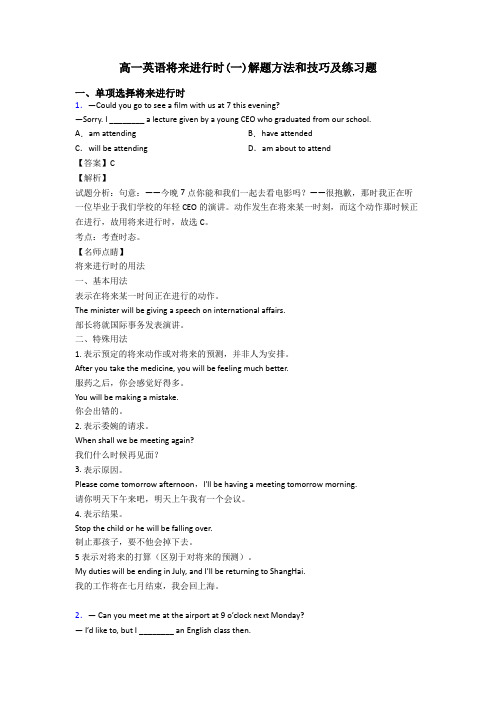
高一英语将来进行时(一)解题方法和技巧及练习题一、单项选择将来进行时1.—Could you go to see a film with us at 7 this evening?—Sorry. I ________ a lecture given by a young CEO who graduated from our school.A.am attending B.have attendedC.will be attending D.am about to attend【答案】C【解析】试题分析:句意:——今晚7点你能和我们一起去看电影吗?——很抱歉,那时我正在听一位毕业于我们学校的年轻CEO的演讲。
动作发生在将来某一时刻,而这个动作那时候正在进行,故用将来进行时,故选C。
考点:考查时态。
【名师点睛】将来进行时的用法一、基本用法表示在将来某一时间正在进行的动作。
The minister will be giving a speech on international affairs.部长将就国际事务发表演讲。
二、特殊用法1. 表示预定的将来动作或对将来的预测,并非人为安排。
After you take the medicine, you will be feeling much better.服药之后,你会感觉好得多。
You will be making a mistake.你会出错的。
2. 表示委婉的请求。
When shall we be meeting again?我们什么时候再见面?3. 表示原因。
Please come tomorrow afternoon,I'll be having a meeting tomorrow morning.请你明天下午来吧,明天上午我有一个会议。
4. 表示结果。
Stop the child or he will be falling over.制止那孩子,要不他会掉下去。
高一英语重点语法

高一英语重点语法1. 一般现在时态:- 结构:主语 + 动词原形- 用法:用于表达客观现象、普遍真理、经常性行为等。
2. 一般过去时态:- 结构:主语 + 动词过去式- 用法:用于表达过去发生的事情或状态。
3. 一般将来时态:- 结构:主语 + will + 动词原形- 用法:用于表达将来的计划、打算或预测。
4. 现在进行时态:- 结构:主语 + be动词(am/is/are)+ 动词ing形式- 用法:用于表达现在正在进行的动作。
5. 过去进行时态:- 结构:主语 + was/were + 动词ing形式- 用法:用于表达过去某时正在进行的动作。
6. 将来进行时态:- 结构:主语 + will be + 动词ing形式- 用法:用于表达将来某时正在进行的动作。
7. 现在完成时态:- 结构:主语 + have/has + 过去分词- 用法:用于表达过去某个时间点之前发生的事情对现在产生的影响或结果。
8. 过去完成时态:- 结构:主语 + had + 过去分词- 用法:用于表达过去某个时间点之前已经完成的动作。
9. 将来完成时态:- 结构:主语 + will have + 过去分词- 用法:用于表达将来某个时间点之前已经完成的动作。
10. 情态动词:- 情态动词 can 表示能力、许可或可能性。
- 情态动词 must 表示必须或推测。
- 情态动词 should 表示建议或应该。
- 情态动词 may/might 表示可能性或许可。
这些是高一英语重点语法的一些例子,掌握这些语法知识可以帮助学生更好地理解和运用英语。
同时,高一的英语语法也涉及到其他更复杂的语法规则和用法,建议学生在平时学习中多多练习和积累,以便提高英语语法水平。
高一预备单元英语知识点

高一预备单元英语知识点英语是学生们必修的一门语言课程,从初中开始学习,到高中继续深造。
作为高中一年级的学生,你将进入高一预备单元,这是一个阶段性的过渡,帮助你回顾和巩固初中阶段的英语知识,并为高中英语的学习打下基础。
在这个单元,我们将重点回顾和掌握一些重要的英语知识点,下面是几个重要的知识点及其解释。
一、动词时态:动词时态是英语语法中非常重要的一部分。
在高一预备单元中,你将学习过去时、现在进行时和将来时等时态的用法和规则。
比如,过去时用于描述已经发生的动作或状态,现在进行时用于描述当前正在进行的动作或状态,将来时用于描述将来要发生的动作。
二、冠词的用法:冠词是英语中一个重要的语法点。
在高一预备单元中,你将学习和复习定冠词(the)和不定冠词(a/an)的用法。
定冠词用于特指已知的人或事物,不定冠词用于泛指某一类人或事物。
三、名词的复数形式:名词的复数形式是英语语法中的一个基本知识点。
在高一预备单元中,你将学习和掌握一般名词如何变为复数形式。
一般来说,在名词末尾加上-s或-es即可形成复数形式。
四、形容词的比较级和最高级:形容词的比较级和最高级用于对两个或多个事物进行比较。
在高一预备单元中,你将学习如何构建形容词的比较级和最高级,以及它们在句子中的用法。
除了以上几个重点知识点外,高一预备单元还包括其他一些语法知识,如副词的用法、介词短语的搭配和时态的混合使用等等。
这些知识点都是你在高中英语学习中必须掌握的基础。
总而言之,高一预备单元英语知识点的学习对于你接下来的英语学习至关重要。
通过巩固和掌握这些知识,你将为高中英语的学习打下坚实的基础。
希望你在学习中能够认真对待,积极参与,取得优异的成绩。
祝你学习愉快!。
高一英语_必修1+必修2_语法复习_打印版_4页
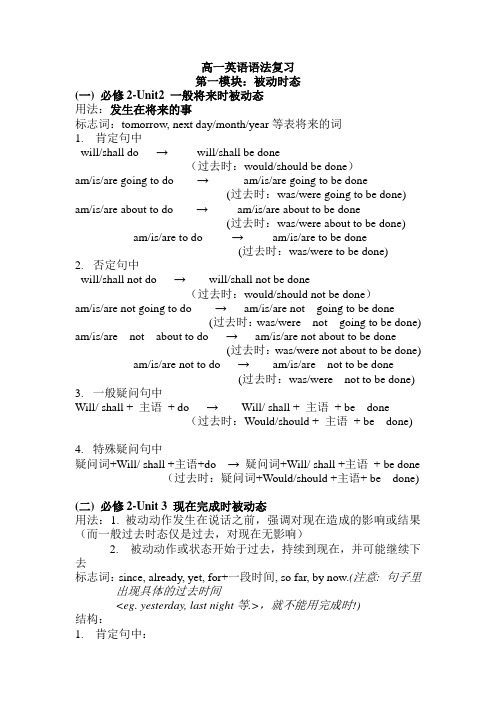
高一英语语法复习第一模块:被动时态(一) 必修2-Unit2 一般将来时被动态用法:发生在将来的事标志词:tomorrow, next day/month/year等表将来的词1. 肯定句中will/shall do →will/shall be done(过去时:would/should be done)am/is/are going to do →am/is/are going to be done(过去时:was/were going to be done) am/is/are about to do →am/is/are about to be done(过去时:was/were about to be done) am/is/are to do →am/is/are to be done(过去时:was/were to be done)2.否定句中will/shall not do →will/shall not be done(过去时:would/should not be done)am/is/are not going to do →am/is/are not going to be done(过去时:was/were not going to be done) am/is/are not about to do →am/is/are not about to be done(过去时:was/were not about to be done) am/is/are not to do →am/is/are not to be done(过去时:was/were not to be done) 3.一般疑问句中Will/ shall + 主语+ do →Will/ shall + 主语+ be done(过去时:Would/should + 主语+ be done) 4.特殊疑问句中疑问词+Will/ shall +主语+do →疑问词+Will/ shall +主语+ be done(过去时:疑问词+Would/should +主语+ be done) (二) 必修2-Unit 3 现在完成时被动态用法:1. 被动动作发生在说话之前,强调对现在造成的影响或结果(而一般过去时态仅是过去,对现在无影响)2. 被动动作或状态开始于过去,持续到现在,并可能继续下去标志词:since, already, yet, for+一段时间, so far, by now.(注意: 句子里出现具体的过去时间<eg. yesterday, last night等.>,就不能用完成时!)结构:1. 肯定句中:has/have done →has/have been done (过去时:had been done) 2.否定句中has/have not done →has/have not been done(过去时:had not been done)3.一般疑问句中Has/have +主语+done →has/have +主语+ been done(过去时:had +主语+ been done)4.特殊疑问句疑问词+has/have +主语+done →疑问词+has/have +主语+ been done(过去时:疑问词+had+主语+ been done)例子:This problem has been discussed(讨论) for two weeks.(三)Unit 4 现在进行时被动态用法:1. 表示正在进行或发生的被动动作。
高一英语过去完成时知识点
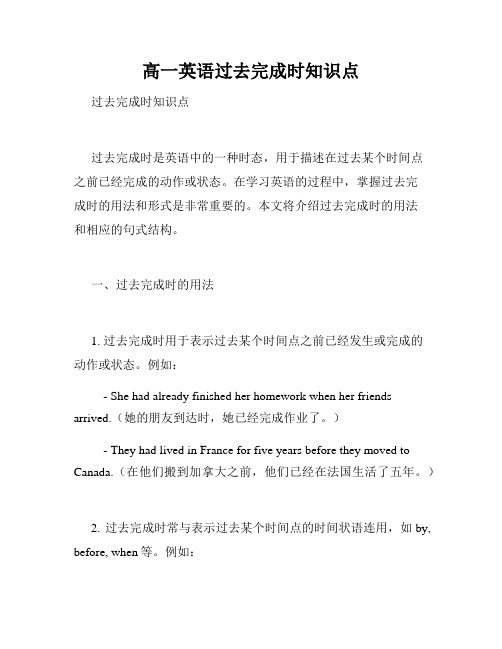
高一英语过去完成时知识点过去完成时知识点过去完成时是英语中的一种时态,用于描述在过去某个时间点之前已经完成的动作或状态。
在学习英语的过程中,掌握过去完成时的用法和形式是非常重要的。
本文将介绍过去完成时的用法和相应的句式结构。
一、过去完成时的用法1. 过去完成时用于表示过去某个时间点之前已经发生或完成的动作或状态。
例如:- She had already finished her homework when her friends arrived.(她的朋友到达时,她已经完成作业了。
)- They had lived in France for five years before they moved to Canada.(在他们搬到加拿大之前,他们已经在法国生活了五年。
)2. 过去完成时常与表示过去某个时间点的时间状语连用,如by, before, when等。
例如:- He had already left by the time I arrived.(当我到达时,他已经离开了。
)- They had finished the project before the deadline.(在截止日期之前,他们已经完成了这个项目。
)3. 过去完成时还可用于表示过去某个时间点之前的条件或假设。
例如:- If I had known about the party, I would have attended.(如果我当时知道有这个派对,我就会参加。
)- He would have passed the exam if he had studied harder.(如果他学习更努力,他会通过考试的。
)二、过去完成时的句式结构过去完成时的句子由"had + 过去分词"构成。
其中,"had"是过去完成时的助动词,用于表示完成的动作或状态;过去分词表示动作的完成形式。
以下是几种常见的过去完成时的句式结构:1. 肯定句:主语 + had + 过去分词- I had finished my work.- They had already left.2. 否定句:主语 + hadn't + 过去分词- She hadn't seen the movie before.3. 疑问句:Had + 主语 + 过去分词 + 其他? - Had you finished your homework?- Had they arrived when you called?4. 肯定回答:Yes, 主语 + had.- Yes, I had finished my work.5. 否定回答:No, 主语 + hadn't.- No, she hadn't seen the movie before.三、过去完成时的注意事项1. 过去完成时通常与过去时间相关,可以使用时间状语词或从句指明过去的时间点。
(完整版)高一英语必修一语法知识点总结

(完整版)高一英语必修一语法知识点总结高一英语必修一语法知识点总结1. 时态- 过去时:表示过去发生的动作或状态。
例如:He played football yesterday.(他昨天踢了足球。
)- 现在时:表示现在正在进行或经常发生的动作。
例如:She is reading a book.(她正在读一本书。
)- 将来时:表示将来要发生的动作或状态。
例如:I will go to the park tomorrow.(明天我将去公园。
)2. 名词- 单数名词:表示一个人、物或概念。
例如:book(书)- 复数名词:表示多个人、物或概念。
例如:books(书)- 不可数名词:表示抽象概念或一类事物。
例如:information(信息)3. 代词- 主格代词:在句子中做主语。
例如:I(我)- 宾格代词:在句子中做宾语。
例如:him(他)- 形容词性物主代词:用来表示所属关系。
例如:my(我的)4. 形容词- 描述名词的特征或性质。
例如:beautiful(美丽的)5. 副词- 描述动词、形容词、副词或全句的特征。
例如:quickly(快速地)6. 动词- 表达动作、状态或存在。
例如:run(跑)7. 介词- 表示位置、方向、时间、原因等关系。
例如:in(在)8. 连词- 连接词语、短语、从句等。
例如:and(和)以上是高一英语必修一中的一些重要的语法知识点总结。
(注意:文档内容仅供参考,请勿引用未经确认的内容。
)。
高一英语语法练习(时态一)
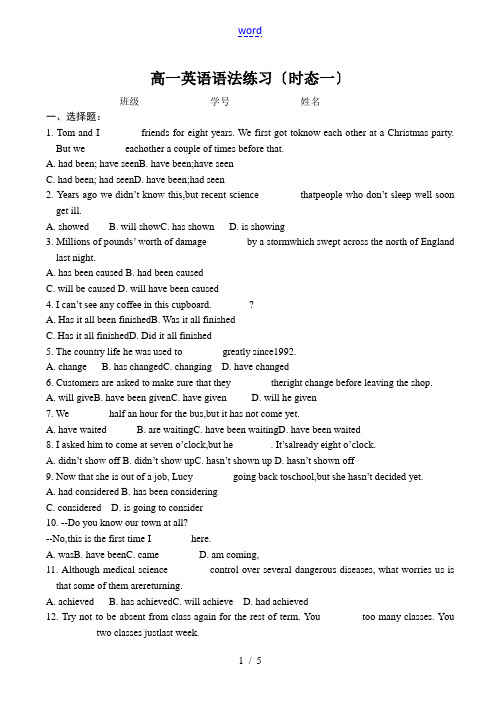
高一英语语法练习〔时态一〕班级____________ 学号____________ 姓名____________一、选择题:1. Tom and I _______ friends for eight years. We first got toknow each other at a Christmas party. But we _______ eachother a couple of times before that.A. had been; have seenB. have been;have seenC. had been; had seenD. have been;had seen2. Years ago we didn’t know this,but recent science _______ thatpeople who don’t sleep well soon get ill.A. showedB. will showC. has shownD. is showing3. Millions of pounds’ worth of damage _______ by a stormwhich swept across the north of England last night.A. has been causedB. had been causedC. will be causedD. will have been caused4. I can’t see any coffee in this cupboard. _______?A. Has it all been finishedB. Was it all finishedC. Has it all finishedD. Did it all finished5. The country life he was used to _______ greatly since1992.A. changeB. has changedC. changingD. have changed6. Customers are asked to make sure that they _______ theright change before leaving the shop.A. will giveB. have been givenC. have givenD. will he given7. We _______ half an hour for the bus,but it has not come yet.A. have waitedB. are waitingC. have been waitingD. have been waited8. I asked him to come at seven o’clock,but he _______. It’salready eight o’clock.A. didn’t show offB. didn’t show upC. hasn’t shown upD. hasn’t shown off9. Now that she is out of a job, Lucy _______ going back toschool,but she hasn’t decided yet.A. had consideredB. has been consideringC. consideredD. is going to consider10. --Do you know our town at all?--No,this is the first time I _______ here.A. wasB. have beenC. cameD. am coming,11. Although medical science _______ control over several dangerous diseases, what worries us is that some of them arereturning.A. achievedB. has achievedC. will achieveD. had achieved12. Try not to be absent from class again for the rest of term. You _______ too many classes. You ________two classes justlast week.A. have missed; missedB. missed; missedC. had missed; have missedD. will miss;have missed13. My friend, who _______ on the International Olympic Committee all his life, is retiringnext month.A. servedB. is servingC. had servedD. has served14. I found a bucket, ________ it in the sink and turned the tap on.A. putB. puttingC. to putD. having put15. With the rapid growth of population, the city _______ in all directions in the past five years.A. spreadsB. has spreadC. spreadD. had spread16. –How long _______ at his job? –Since 1990.A. were you employedB. have you been employedC. had you been employedD. will you be employed17. How can you possibly miss the news? It _______ on TV all day long.A. has beenB. had beenC. wasD. will be18. –Did Henry paint the whole house himself?–He ________because he doesn’t like to climb a ladder.A. hadn’t painted itB. had it paintedC. had painted itD. painted it19. – How are you today?–Oh, I _______ as ill as I do now for a very long time.A. didn’t feelB. wasn’t feelingC. don’t feelD. haven’t felt20. I _______ Ping-pong quite well, but I haven’t had time to play since the new year.A. playedB. will playC. have playedD. play21. I wonder why Jenny _______ us recently. We should have heard from her by now.A. hasn’t writtenB. doesn’t writeC. won’t writeD. hadn’t written22. Although he has lived with us for years, he _______ us much impression.A. hadn’t leftB. didn’t leaveC. doesn’t leaveD. hasn’t left23. The first use of atomic weapons was in 1945, and their power _______ increased enormously ever since.A. isB. wasC. has beenD. had been24. She has set a new record, that is, the sales of her latest book _______ 50 million.A. have reachedB. has reachedC. are reachingD. had reached25. More patients _______ in hospital this year than last year.A. treatedB. have treatedC. had been treatedD. have been treated26. -- The window is dirty. -- I know. It _______for weeks.A. hasn’t cleanedB. didn’t cleanC. wasn’t cleanedD. hasn’t been cleaned27. The earthquake lasted so long that I thought the end of the world ________.A. will comeB. has comeC. would have comeD. had come28. The coffee is wonde rful! It doesn’t taste like anything I _______ before.A. was havingB. haveC. have ever hadD. had ever had29. My brother is an actor. He _______ in several films so far.A. appearsB. appearedC. has appearedD. is appearing30. I _______ in London for many years, but I’ve never regretted my final decision to moveback to China.A. livedB. was livingC. have livedD. had lived31. I came across an old photograph of you yesterday. It ________ when you were at school.A. had takenB. had been takenC. tookD. was taken32. I won’t tell the student the answer to the math problem until he _______ on it for morethan an hour.A. has been workingB. will have workedC. will have been workingD. had worked33. –Have you had a good evening?–Well, I ________ this film on television but it’s rubbish so I think I’ll turn it off now.A. watchedB. was watchingC. have been watchingD. had been watching34. If Alison knew anything about car mechanics, I’m sure she would help us fix the car, but I think she ________ even less than we do.A. knowsB. knewC. had knownD. would know35. I had a pleasant surprise when I got to my room: someone _______ some flowers there for me.A. was gatheringB. has sent outC. has been keepingD. had put36. The outdoor swimming pool, where we often went as children, has ________ now.A. fixed upB. been closed downC. been taken onD. turned up37. They’re very angry. They ________ to see you for the last two or three hours.A. are managingB. will promiseC. had made up their mindsD. have been trying38. Mr. Little ________ ready to fly his plane in the local air show when he heard a tapping noise coming from inside.A. becameB. has madeC. had preparedD. was getting39. The robber ran out of the bank and ________ shortly afterwards.A. had disappearedB. has been caughtC. was arrestedD. would be missing40. Two metres of snow fell during the night. As a result, several main roads ________.A. piled snowB. had been closedC. were blockedD. covered with snow41. Tony finished his meal, ________ the bill, and left the restaurant.A. payingB. to checkC. checkingD. paid42. I don’t know whether he will arrive soon, but if he ________, I will ask him to help you.A. will doB. doesC. shallD. is going to43. A couple of decades ago, he ________America and lives there now.A. had moved toB. had goneC. was to visitD. left for44. The moment an agreement ________ after a long discussion, everybody shouted, “Hurrah!〞A. put forwardB. was appearedC. reachedD. was arrived at45. All the passengers object to transferring to the next flight ________ they ________ a proper explanation.A. though; will giveB. unless; are givenC. if; have giveD. so long as; get二、翻译1.我已经看了说明,但我还是不理解。
【英语】高一英语过去将来时(一)解题方法和技巧及练习题含解析

【英语】高一英语过去将来时(一)解题方法和技巧及练习题含解析一、单项选择过去将来时1.She hurried to the entrance at which the car _____, and looked forward to seeing her husband.A.would arrive B.has arrives C.arrived D.will arrive【答案】A【解析】试题分析:考查动词时态。
根据looked forward to seeing her husband.可知汽车还没有到达,因此用过去将来时态,句意:她匆忙跑到汽车将会到达的入口处,盼望着能看到她的丈夫。
考点:考查动词时态。
2.—Have you been to Mexico?—No, I ______ last year, but Dad wouldn’t let me.A.was to have gone B.was to goC.was gone D.went【答案】A【解析】【详解】试题分析:考查时态。
句意:——你去过墨西哥吗?——没有,去年我打算去的,但爸爸不让我去。
be + to do通常表示“计划、安排”将要做的事情,还表示“有义务”要做的事。
但在此,was to have done表示“过去原打算要做而没有做的事”。
故选A。
3.My father told me that he ________ me some gifts when he returned from America the next week.A.will buy B.buy C.would buy D.buy【答案】C【解析】试题分析:考查动词的时态。
句意:我的父亲告诉我,下周他会从美国返回,会给我带礼物。
根据时间状语 the next week可知用将来时,再根据told可知用过去将来时,故选C 项。
考点 : 考查动词的时态4.The students were told that they _____ at the school gate at 2:00 the following afternoon. A.met B.will meetC.were to meet D.were met【答案】C【解析】试题分析:考查时态的语境运用。
高一英语 语法复习 连词时态

照对市爱民阳光实验学校高一英语语法复习连词时态知识精练Fill in the blanks with the given words in the text.Change their form if necessary.know compose change go talent impress music popular encourageHaydn,Mozart,Beethoven were all the world famous musicians.Haydn is ________________ as “the father of the symphony〞.He ________________ other composers’ symphonies into a long piece for a large orchestra.Mozart had ________________talent from an early age.He started ________________ music when he was five.When Haydn met him first,he was deeply ________________ with Mozart’s________________.When Haydn met Beethoven,he ________________ Beethoven to ter Beethoven became very ________________ in Austrian capital.He composed many famous pieces even after he began to ________________deaf.答案:known changed musical composing impressed talent encouraged popular go典例剖析A.例题分析【例1】 He moved to America with his parents________________.A.in his teensB.in his tensC.in the teensD.in the tens解析:在某人十几岁时,用in one’s teens而不是in one’s tens。
高一英语语法(2-1):动词的时态之一般现在时、现在进行时和现在完成时

高一英语语法(2-1):动词的时态之一般现在时、现在进行时和现在完成时一、动词有4个时、4个态,一共有16个时态1. 以work为例2. 在下列数轴上标注出时态的位置1)work / works2)am / is / are working3)have / has worked二、一般现在时(work / works)、现在进行时(am / is / are working)和现在完成时(have / has worked)1.一般现在时1)表示经常发生或习惯性的动作或状态,通常与usually,often,always,sometimes,every day,once a week等时间状语连用,有时也可不加这类状语。
如:2)表示客观事实或普遍真理。
如:The earth __________ (move) around the sun. 3)按时刻表、日程表、节目单、课程表等规定将要发生的动作,也用一般现在时表示将来。
如:The plane __________ (arrive) at 8:00 and __________ (leave) at 8:30.4)在连词when,as soon as,before,until,if等引导的表示未来行为的时间或条件状语从句中,常用一般现在时代替将来时,这是英语的习惯表达法。
但he __________ (come) here, he __________ (go) to visit you.2.现在进行时1)表示此时此刻正在进行的动作。
如:They __________ (have) an English class2)表示现阶段正在进行的动作,虽然此时此刻这一动作不一定在进行。
如:The3)在时间、条件状语从句中,有时可用现在进行时代替一般将来时。
如:When you __________ (pass) my way, please drop in. (详见二-6“即将”)4)现在进行时与always,all the time,forever,constantly等副词连用,表示感叹、惊讶、赞许、厌恶等情感。
高一英语语法(2-3):动词的时态之一般将来时、过去将来时和将来完成时
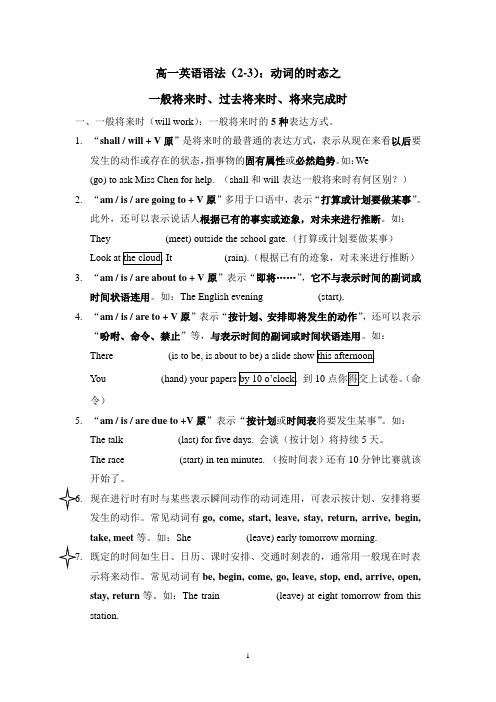
高一英语语法(2-3):动词的时态之一般将来时、过去将来时、将来完成时一、一般将来时(will work):一般将来时的5种表达方式。
1.“shall / will + V原”是将来时的最普通的表达方式,表示从现在来看以后要发生的动作或存在的状态,指事物的固有属性或必然趋势。
如:We __________ (go) to ask Miss Chen for help. (shall和will表达一般将来时有何区别?)2.“am / is / are going to + V原”多用于口语中,表示“打算或计划要做某事”。
此外,还可以表示说话人根据已有的事实或迹象,对未来进行推断。
如:They __________ (meet) outside the school gate.(打算或计划要做某事)(根据已有的迹象,对未来进行推断)3.“am / is / are about to + V原”表示“即将……”,它不与表示时间的副词或时间状语连用。
如:The English evening __________ (start).4.“am / is / are to + V原”表示“按计划、安排即将发生的动作”,还可以表示“吩咐、命令、禁止”等,与表示时间的副词或时间状语连用。
如:到10(命令)5.“am / is / are due to +V原”表示“按计划或时间表将要发生某事”。
如:The talk __________ (last) for five days. 会谈(按计划)将持续5天。
The race __________ (start) in ten minutes. (按时间表)还有10分钟比赛就该开始了。
现在进行时有时与某些表示瞬间动作的动词连用,可表示按计划、安排将要发生的动作。
常见动词有go, come, start, leave, stay, return, arrive, begin, take, meet等。
英语中的16种时态(全)

动词16个时态一、一般现在时1.概念:表示经常发生的情况;有规律出现的情况;总是发生的;和事实真理。
2.时间状语:Always, usually, often, sometimes, every week (day, year, month…),once a week(day, year, month…),on Sundays(on Mondays …),3.基本结构:动词原形(如主语为第三人称单数,动词上要改为第三人称单数形式)4.否定形式:主语 + am/is/are + no t + 其他;此时态的谓语动词若为行为动词,则在其前加don't,如主语为第三人称单数,则用doesn't,同时还原行为动词。
5.一般疑问句:把be动词放于句首;用助动词do提问,如主语为第三人称单数,则用does,同时,还原行为动词。
6.例句:It seldom snows here.这里很少下雪。
He is always ready to help others.他总是乐于帮助别人。
Action speaks louder than words.事实胜于雄辩。
二、一般过去时1.概念:过去某个时间里发生的动作或状态;过去习惯性、经常性的动作、行为。
2.时间状语:ago, yesterday, the day before yesterday, last week, last(year, night, month…),in 1989,just now, at the age of 5,one day, long long ago, once upon a time, etc.3.基本结构:主语 + 动词的过去式或be的过去式+名词4.否定形式:主语 + was/were + not + 其他;在行为动词前加didn't,同时还原行为动词。
5.一般疑问句:was或were放于句首;用助动词do的过去式did 提问,同时还原行为动词。
高一英语一般将来时(一)解题方法和技巧及练习题及解析

高一英语一般将来时(一)解题方法和技巧及练习题及解析一、单项选择一般将来时1.“What do you want to be?” asked Mrs. Crawford. “Oh, I ________ president,” said the boy, with a smile.A.have been B.amC.was D.will be【答案】D【解析】试题分析:考查动词的时态。
句意:Crawford夫人问道:“你(长大了)想干什么?”“哦,我想当总统。
”男孩面带微笑地说。
根据问句“W hat do you want to be?”可知,该句中暗含“when you grow up”,因此回答用一般将来时。
2.The students have been working hard on their lessons and their efforts _____ with success in the end.A.rewarded B.were rewardedC.will reward D.will be rewarded【答案】D【解析】【分析】【详解】本题考查时态和语态。
解题步骤:1. 确定时态:根据句尾的in the end可知,事情发生在将来,用将来时。
2. 确定语态:efforts和reward是被动关系,应该使用被动语态。
句意:学生们一直在刻苦学习功课,他们的努力终将会得到回报。
综上,用一般将来时的被动,故选D。
【点睛】一般将来时1. 表示未来的动作或状态常用will / shall + 动词(常与表示将来的时间状语边用如tomorrow、next week等)。
2. 表示一种趋向或习惯动作。
例如:We’ll die without air or wa ter.3. 表示趋向行为的动词如come, go, start, begin, leave等词常用进行时的形式表示将来时。
4. be going to与will / shall, be to do, be about to do用法及区别:(1)shall / will do表示未事先考虑过,即说话时临时作出的决定。
- 1、下载文档前请自行甄别文档内容的完整性,平台不提供额外的编辑、内容补充、找答案等附加服务。
- 2、"仅部分预览"的文档,不可在线预览部分如存在完整性等问题,可反馈申请退款(可完整预览的文档不适用该条件!)。
- 3、如文档侵犯您的权益,请联系客服反馈,我们会尽快为您处理(人工客服工作时间:9:00-18:30)。
妙手填词
1. Anyone who knows about the world-famous scientists Steven Hawking can see that within his small and weak figure, he carries ______(carry) a big heart. 2. --- Excuse me, sir. Could I leave for a while to buy something? begins --- All right, but don’t be too late. Your flight _____ (begin) boarding at 2:15. 3. If city noises __________ are not kept (not keep) from increasing, people will have to shout to be heard even at the dinner table in 20 years. 4. You’d better write down her phone number before forget you ______(forget) it. 5. Whenever you _____(buy) a present, you should buy think about it from the receiver’s point of view.
即学即练
1. Walmart, which is one of the largest American supermarket chains, _____ some of its stores open 24 keeps B. keep C. have kept D. had kept 2. Planning so far ahead _______ no sense --- so many things will have changed by next year. A. made B. is making C. makes D. has made 3. -Do you know if Terry will go camping this weekend? -Terry? Never! She ______ tents and fresh air! A. has hated B. hated C. will hate D. hates 4. That’s why I help brighten people’s days. If you ____, who’s to say that another person will? A. didn’t B. don’t C. weren’t D. haven’t
5. be(am/is/are) doing表示“移动”意义的动词用现 在进行时代替将来表计划或安排好的动作(go, come, leave, arrive, return, fly, take off, move, start, begin, finish...) --- Have you heard that Sting is coming this weekend? --- Yes, I can’t wait to see him. They are leaving for Beijing. National Day is coming. Please fasten your seat belt. The plane is taking off soon.
Exhibition center:
Exhibition center:
5. Nothing is impossible: believe in yourself and never give up easily.
May you go on well with your study in Senior High School!
4. be(am/is/are) to do ①表示按计划或安排要做的事; ②表示“应该”,相当于should/ought to do; ③用于条件句中,表示“想要”; ④表示“注定会…” A new bridge is to be built over the river soon. She is to be married next month. After dinner they are to go to the movies. You are to report it to the police. No one is to leave the building without permission. You are to do your homework before you watch TV. If we are to be there before ten, we’ll have to go now. If you are to pass the exam, you’ll have to study harder from now on. I believe that he is to make a great football player.
Fish will die without water.
Accidents will happen.
2. be(am/is/are) going to do ①多用在口语中,表示将来的安排、计划和打算; ②表示根据现在的迹象,对未来进行推断 Tom is going to visit his uncle next week. Look at the dark clouds. It is going to rain. 试比较: --- Ann is in hospital. ---① Oh, really? I didn’t know. I will go and visit her. ---② Oh, really? I didn’t know. I am going to visit her tomorrow. 3. be(am/is/are) about to do 表示即将发生的动作(不跟具体的时间状语连用) The medical team is about to start. The new school year is about to begin.
Simple future tense一般将来时 (五种表达方式)
1. will/shall do(shall 只用于第一人称)
①表将来发生的动作或出现的状态(一般表临时决定); ②表示事物的固有属性或必然趋势 --- Have you brought your dictionary? --- No, I forgot. I’ll borrow one.
高一英语网络课
2. 培养英语思维。查字典时多看这个词的英文解释, 形成英语思维习惯。 3. 养成预习-上课-复习的好习惯。做好课前预习,立 足课堂,认真听讲,跟着老师的要求和指示一步一步 的进行学习,课后及时巩固和复习。 切不可等到考试 前再发奋,甚至临时抱佛脚;不懂就问,错题或者难 题都要及时弄懂;错题回顾,避免一错再错。 4. 注意书写:字迹清楚大气,杜绝蚂蚁体。(练字)
5. Look at the timetable. Hurry up! Flight 4026 ____ at 18:20. A. takes off B. took off C. will be taken off D. has taken off 6. If we ______ now to protect the environment, we’ll live to regret it. A. hadn’t acted B. haven’t acted C. don’t act D. won’t act 7. --- Alan seems a lot taller than I saw him last time. --- He _____. He’s grown a foot since you saw him in Shanghai. A. is B. will be C. has been D. was 8. Around two o’clock every night, Sue will start talking in her dream. It somewhat _____ us. A. bothers B. was bothering C. has bothered D. bothered
高中英语学习的几点建议
1、决定英语学习成败的“双量”:词汇量和阅读量。 没 有大量的阅读保证,肯定是学不好英语的。高一的主要任 务就是迅速大量扩充词汇量。 * 单词,一定要在语境中进行,一定要语篇中去记忆,做 到“词不离句,句不离文”,不要孤立的记单词。 背单 词时,切忌死记硬背,要根据发音识记,背它的发音,背 它的整体形状,做到一听发音,或一看到形状,就能反应 出它的意思,把背单词拼写放在最后一步。 * 高中英语语言综合能力的培养,主要是通过大量阅读来 实现的。高中语篇阅读篇目增长,涉及的话题范围更广, 阅读题目难度增大,对思维能力要求增高。加强课外阅读 和阅读理解练习,扩大词汇量和知识面、提高阅读理解速 度和能力。
4. 用于if, unless引导的条件状语从句中,when, before, until/till, as soon as, the moment, once引 导的时间状语从句中,no matter what/who/which/when/where/how或whatever, whoever, whichever, whenever, wherever, however引导的让步状语从句中,表示将来的动作或状 态(主将从现) The sports meeting will be put off if it rains. When Bill comes, tell him I’ll be back soon. Whoever breaks the law will be punished. No matter who breaks the law, he will be punished. I will discuss this with you when we meet ____(meet).
